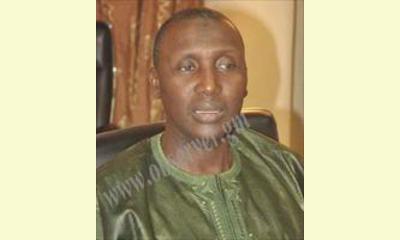|
|
Gambia: PS Bouy Launches WANEP Peace Education Implementation Guide
an article by Alieu Ceesay, Daily Observer, The Gambia (abridged)
The permanent secretary at the Ministry of Basic
and Secondary Education, Babucarr Bouy on behalf
of his minister, on Wednesday [October 30]
launched the Implementation Guideline for Peace
Education in formal schools in The Gambia by the
West Africa Network for Peace building (WANEP) at
TANGO conference hall. Peace education is one of
the numerous ways WANEP-Gambia seeks to ensure the
livelihood in the Gambia is maintained through a
culture of peace. The peace education programmes
are centred on conflict resolution typically on
the symptoms of conflict; training individuals
particularly the young on the need to resolve
inter-personal disputes through techniques of
mediation and negotiation.

Permanent secretary at the Ministry of Basic and Secondary Education, Babucarr Bouy
click on photo to enlarge
The programme was launched in August 2000 as a
pilot programme in seven West African countries
and within the past years, the programme has gone
through various phases beginning with the
development of training materials on peace
building. In his official launching statement, PS
Bouy said the launching of the guide could not
have come at a better time; as over the last two
decades, many countries in the sub-region are
affected by major wars and violent conflicts and
are now grappling with its aftermath. "These
include physical and psychological impacts which
generally affect children and young people. This
had led to an increase in vulnerable youths. Thus
in most countries parents are especially compelled
to use meager resources to meet their children's
numerous needs; such as enforcing discipline,
rehabilitation and welfare support," he remarked.
The permanent secretary explained that peace
education being a pedagogical approach, aimed at
promoting a culture of peace and preventing the
incidence of conflict is also seen to help in the
prevention of turmoil. T he PS also noted that it
is a process of promoting the knowledge, skills,
attitudes and values needed to bring about
behavioral change that will enable all
stakeholders prevent conflict and violence. He
went on to note that Peace Education is critical
for addressing the alarming challenges of
providing welfare support, to control discipline
and rehabilitate juveniles. While it is
undoubtedly accepted that education is a platform
that can help change negative cultures into
cultures of peace, PS Bouy said, peace education
will educate teachers and citizenry with the
knowledge, values, skills and capacities conducive
to the social transformation of repressive
cultures, addresses forms of violence such as
racism and raises awareness and take action in the
schools to liberate the schools and subsequent
cultures from oppressive systems. To realize this
aspiration, Bouy indicated, the Peace Education
Programme herein will purposely educate for
peaceful values, cultural solidarity, personal and
community empowerment and creative minds, in order
to foster students to be responsible citizens,
open to other cultures, respectful of diversity
and committed to non-violence". . .
|








|
DISCUSSION
Question(s) related to this article:
Peace Studies in School Curricula, What would it take to make it happen around the world?
* * * * *
Latest reader comment:
During the Asian Educators Symposium, we found out that Peace Education is still not part of the school curriculum in most countries. However, the participating teachers have been incorporating peace education in their teaching subjects, such as English, social studies, and character education. We all agreed that love and the will to nurture peace in children are the most important basis for peace education. Even if peace education is not a part of the curriculum, peace can be taught through any subject. Whatever you are teaching, if it comes from the heart, then it will touch the minds of children.

|
|









